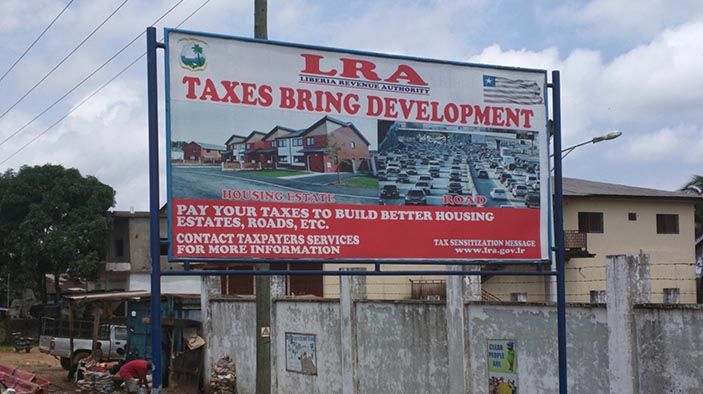Liberia—Revenue Generation for Governance and Growth (RG3)
Client: U.S. Agency for International Development
Duration: 2016-2021
Region: Sub-Saharan Africa
Country: Liberia
Solutions: Economic Growth Governance
Enhancing the government of Liberia’s ability to collect taxes from its citizens is critical to the country’s long-term development goals. However, tax evasion, poor tax policy, and ineffective enforcement all constrain the government’s ability to mobilize the domestic revenues it needs to provide basic services to citizens and promote economic growth and social development.
RG3 assisted the Liberia Revenue Authority (LRA) to improve its tax collection system and cultivate accountability among taxpayers. The project paired supply-side support to key government ministries with demand-side interventions that raise awareness of taxation responsibilities, newly simplified payment methods, and the risks of noncompliance.

Sample Activities
- Work with staff across the Ministry of Finance and Development Planning (MFDP) to build tax-related institutional capacity in policy design, organizational structure, and drafting of legislation.
- Facilitate meetings of stakeholders from the private sector, civil society, and government to develop a “fiscal pact” that makes the social contract of taxation explicit and tangible.
- Support the Government of Liberia to develop and roll out awareness campaigns through outreach tools such as billboards, social media, and radio ads.
- Establish and operationalize a toll-free call center to receive, route, and resolve taxpayers’ questions in a customer service-oriented manner.
Select Results
- Facilitated a tenfold increase—from $1.2 million in Q3 2018 to $12.5 million in Q4 2018—in reported taxes due via e-filing.
- Increased taxpayer inquiries to the LRA call center tenfold through aggressive mobile text-messaging outreach.
- Conducted an innovative text-based taxpayer perception survey and a cost-of-compliance survey using computer-assisted telephone interviewing.
- Assisted LRA to establish a data processing center that improved transparency encompassing 70 percent of revenues and generates information to inform audit selection and improve revenue forecasting.
- Assisted in the establishment of the Taxpayer Advocate’s Office that supports taxpayers’ rights in areas such as customs clearance and verification of tax compliance.
- Helped LRA allow taxes to be paid through commercial banks and their branches—as much as $7.3 million in taxes was paid using this method through August 2017.
- Increased tax payment transactions by 48 percent between March and August 2017, compared with the same period in 2016; this is expected to lead to increased revenues for the government.
- Developed, in cooperation with the MFDP, revised draft excise tax legislation that should help significantly increase revenue.
- Introduced mobile payments for all taxes and select nontax fees to reduce time and cost for taxpayers and eliminate risky cash transactions.
Featured Links
RELATED CONTENT:
Liberia—Local Empowerment for Accountability and Decentralization (LEAD)
The Local Empowerment for Accountability and Decentralization Activity (LEAD) works to improve the capacities of select Government of Liberia ministries, agencies, and commissions to formulate and administer sound tax policies, improve budget transparency, deepen decentralization, and improve service delivery at the sub-national level.
Read More